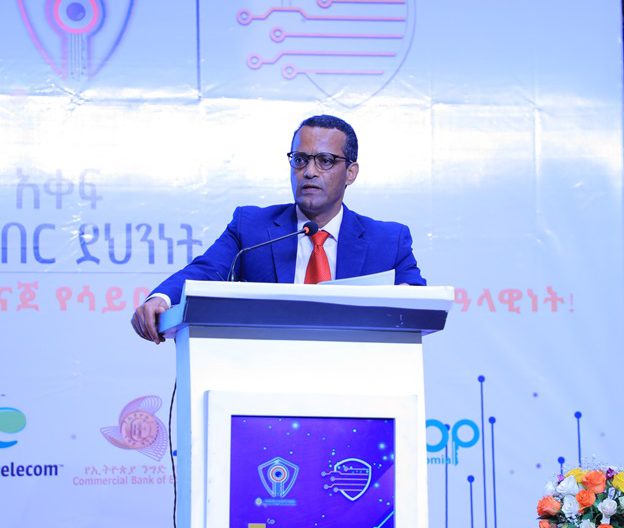
During the recently held 3rd National Cyber Security Month which is the month of October, a consultation forum was held at Skylight Hotel on the theme; reducing the vulnerability of institutions to cyber-attacks.
Civil Service Commissioner Dr. Mekuria Haile and Deputy Director General of Information Network Security Administration Tigist Hamid delivered speech and opened the discussion aimed at protecting key infrastructures and institutions from cyber-attack.
Fighting cyber security threats and what are the threats that make institutions vulnerable to cyber attacks were the main points which Commissioner Dr. Mekuriya raised stressing the fact that large amounts of data (structured or unstructured) that contain complex data sets are growing rapidly overtime.
The Commissioner said that to ensure the cyber security of institutions, the senior leaders of each institution should pay great attention to the matter.
“In order for our country to show rapid and continuous economic growth by using its productive human resources, it is necessary to work with stakeholders at all levels to develop cyber security awareness and capabilities, in addition to making the young generation competent in technology use and innovation.”
According to Mekuriya most of the institutions of our country pay attention to making their work supported by technology. However, both governmental and non-governmental institutions should pay attention to cyber security alongside their efforts to modernize their use of technology and play their part in the allocation of operational systems, technology and qualified human resources.
In particular, to ensure the cyber security of institutions, the senior officers of each institution are required to pay great attention to the issue. Institutions should use the cyber month (October) as a good opportunity to raise the cyber security awareness of their management and employees.
This large amount of information cannot be handled by old or outdated database and software systems. Organizations should use labels or attributes such as quantity, variety, speed, accuracy of data used to describe the quality or overall state of this data, the Commissioner added.
With the high expansion in cyber security attack methods, it can be difficult and difficult to maintain or protect an organization’s performance, growth and position while protecting confidential information due to the fact that one of the main challenges of this era for institutions lays on howo protecting data from attacks and ensure cyber security.
Loss of this significant amount of data can result in loss of customer confidence, loss or theft of customer information, and system disruptions or outages that can lead to significant losses and risks at a highest risk.
This vast collection of information can fall into the wrong or inappropriate hands or be exposed to natural or man-made hazards. Outdated and out-of-date security control systems and technologies used to perform data-related operations and to maintain cyber security will not be eligible in the future because it cannot control large amount of data, it can be corrupted or lost.
The vulnerability of cyber security could occur from various reasons such as gaps in professional skills or knowledge and on top of such vulnerability, this information may also lead for more risks to other attacks.
Given that the data sources are the result of many different technologies, it becomes increasingly complex and difficult to maintain security. Inaccurate and unnecessary data can clutter up the database and disrupt operations. High data pollution causes damage ranging from data logic distortion to data mixing or alteration and data corruption.
The other thing that institutions might potentially suffer from cyber-attack is that confidential information may be leak out and exposed to theft, whether intentionally or unintentionally by an insider. Cybercriminals can use vulnerabilities in systems that are connected to sensitive data to carry out theft or data destruction attacks. Data can be corrupted due to human pressure or negative activities as well as natural disasters.
How to protect institutions from cyber attack
Tigst Hamid, Deputy Director General of the Information Network Security Administration (INSA) said that institutions should look inside into themselves and identify the issues that make them vulnerable to cyber attacks, fill gaps, increase the cyber awareness of experts and work together to protect Ethiopia’s cyber sovereignty.
“Institutions are required to protect themselves through identifying issues that make institutions vulnerable to cyber attacks and filling gaps, the ability of experts to understand cyber ion order to discharge their responsibility to protect Ethiopia’s cyber sovereignty by promoting and team working.
The goal of marching the Cyber Security Month is to reducing organizational vulnerabilities. In this way, there will be a wide awareness and work on what institutions should do to reduce their vulnerability to cyber attacks, she further stated.
Globally, we have become more dependent on technology than ever due to the increasing number of users of technology and internet, especially social media. Although the growing number of people using the digital environment is a new fact of life; Institutions’ lack of awareness and lack of focus on cyber security has put governments at greater risk.
In countries such as Ethiopia, which are entering the digital environment on a large scale, the institutional level of awareness gap on the use of technology is also playing a leading role in cyber attacks that are growing every year. Any kind of cyber-attack on our institutions can cause our institutions to be defamed, loss of income and losses.
“We are at a time when the ability to easily recognize and understand and quickly adopt advanced technologies and applications is critical for institutions to remain competitive in the cyber world.”
According to studies, in terms of the use of technology, 82 percent of the applications used by public service institutions worldwide are vulnerable to cyber-attacks. The director said: “We should update the technologies used by both governmental and private institutions and their operating systems, expand their control and monitoring systems, and by owning and using modern and safe technology, we should jointly prevent and protect against cyber-attacks that may be inflicted on institutions and the country.”
Tigist concluded that as we celebrate the 3rd National Cyber Security Awareness Month; I entrust institutions to look inward and identify issues that lead to cyber vulnerability, to close the loopholes, to increase the cyber awareness capacity of experts and to work together to protect Ethiopia’s cyber sovereignty.
BY HAFTU GEBREZGABIHER
THE ETHIOPIAN HERALD FRIDAY 21 OCTOBER R 2022





